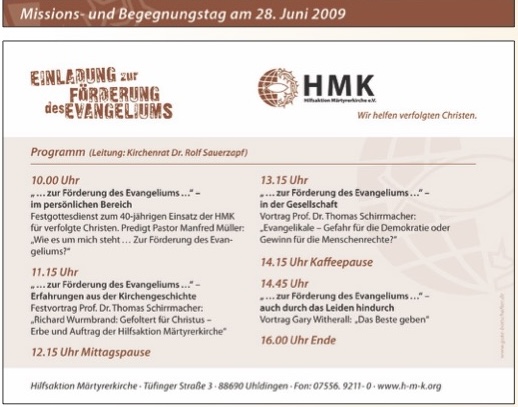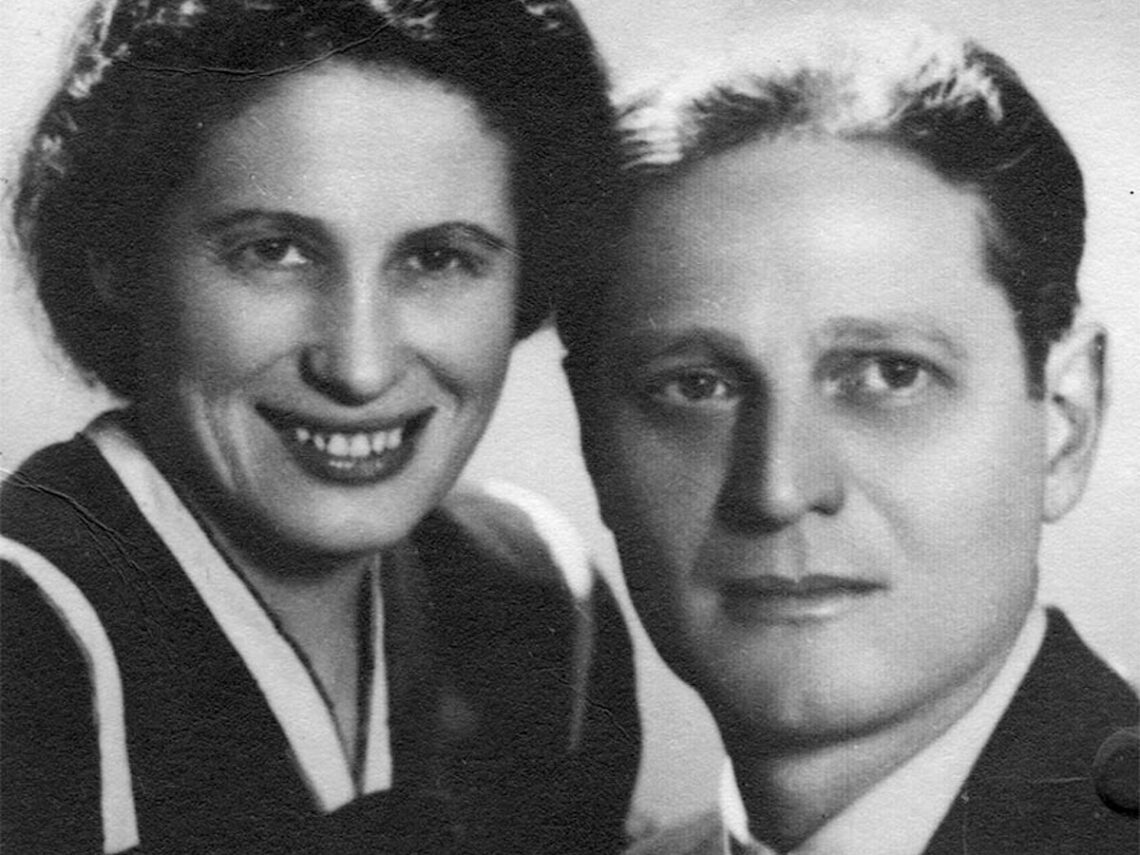(Bonn, 06.06.2025) In 1965, Richard and Sabine Wurmbrand landed in Oslo (Norway), having been bought free by Norwegian Christians after years of imprisonment and torture in Romania. Thus, 60 years ago, an unusual story of worldwide exposure of the persecution of Christians in the communist states began. As early as 1966, film footage of Wurmbrand’s traces of torture from the US parliament went around the world, in 1967 ‘Tortured for Christ’ was published, churches around the world woke up and stood up for their persecuted brothers and sisters.
On this occasion, the President of the International Institute for Religious Freedom (IIRF), Thomas Paul Schirrmacher, recalls the life story of a married couple who made history in their own way.
Richard and Sabine Wurmbrand
Preliminary remark: My relationship with Richard Wurmbrand began in the home of my parents, Bernd and Ingeborg Schirrmacher, and with reading his books as they were published—from ‘Tortured for Christ’ in 1967 (I was born in 1960) to ‘Marx & Satan‘ in 1986, which I examined in connection with my own publications on Marx and communism (see ‘The Young Marx: Karl Marx Before He Became a Philosopher.’ Factum 6/1989: 264–272, reprinted in: Thomas Schirrmacher. Marxismus – Opium für das Volk? – Opium [Marxism – Opium for the People?] 3rd revised edition. VKW: Bonn, 2022 – 1st edition 1990).
In addition, I met Wurmbrand during my studies at a guest lecture at my alma mater, now STH Basel. Together with “Brother Andrew,” Wurmbrand deeply influenced my theology of martyrdom, as my book ‘The Persecution of Christians Concerns Us All’ proves. On June 29, 2009, I gave my first lecture on Wurmbrand in Leinfelden at the annual festival of the Voice of the Martyrs, which Wurmbrand founded. Thanks to the coverage in idea magazine, I received a lot of feedback that inspired me to continue my research on Wurmbrand to this day.

Richard Wurmbrand was born in Bucharest in 1909, the fourth child and fourth son of a poor Romanian Jewish dentist. From 1911 to 1921, the family lived in Istanbul, where his father died when Richard was nine years old. He grew up in great poverty but quickly learned several languages on the streets. He received most of his education by reading his father’s many books. As a young man, he initially became an accountant, then a communist agitator, studying in Moscow for two years from 1927 to 1928. He then edited the Communist Party magazine in Romania and took on other leadership roles, which repeatedly landed him in prison. Looking back, he saw himself at that time as a fervent communist and atheist.
In 1936, he married Sabina Oster, a Jewish woman from Czernowitz, a Jewish settlement center that was then part of Romania and is now part of Ukraine. Sabina broke off her chemistry studies in Paris to marry him. In 1941, their only child, Michael, was born.
To cure his tuberculosis, he moved to the mountain village of Noua in 1937, where he and his wife converted to Evangelical Lutheranism through their friendship with Christian Wölfkes, a Lutheran carpenter of German descent. In 1938, he was baptized by Norwegian Jewish Christians and ordained as an Anglican just one year later. Wurmbrand commemorated his work among Jews and Jewish Christians in his 1980 book ‘Christ On The Jewish Road.’
From 1940, Romania cooperated with Hitler’s Germany, and in 1941 Romania came under German control. In the same year, almost all Jews in Romania were killed, including Sabina’s entire family. In 1940, all British and Anglican citizens were forced to leave Romania, and Richard’s ordination was transferred from the Anglican to the Lutheran Church. Until the end of German rule in 1944, the Wurmbrands helped Jewish Christians and Jews to flee, especially children.
In 1944, Romania was occupied by the Soviet army, and Wurmbrand worked in relative freedom until 1948. Between 1945 and 1947, Wurmbrand had hundreds of thousands of Gospels printed and distributed among members of the Red Army and founded Russian-speaking underground churches. At the same time, he became a successful author, preacher, and lecturer at the Baptist seminary in Bucharest. Wurmbrand persuaded international organizations to distribute food in Romania and, for a short time, represented the International Red Cross, the World Council of Churches, and other church organizations in Europe. He secured accommodation and care for 100 survivors of the Auschwitz concentration camp.
The Wurmbrands were involved in what was already known in the West as the “underground church”; Wurmbrand preferred the terms “persecuted church” or “martyr church” throughout his life. Invited by the government in 1945 to a congress at which church leaders declared their allegiance to the communist government, Wurmbrand spoke before 4,000 listeners and on radio broadcasts throughout the country, saying that Christians must always put Christ and his message first. Surprisingly, he received thunderous applause from the previously “well-behaved” participants.
In 1948, Wurmbrand was kidnapped and imprisoned, and his wife and the public were told that he had died. He was initially imprisoned for eight and a half years, then for another five and a half years. A planned show trial never took place because Wurmbrand could not be broken. In addition to constant torture, brainwashing, and drugs, the most terrible time was three years in solitary confinement twelve meters underground without light or sound. There, Wurmbrand wrote hundreds of sermons and preached them aloud, 350 of which he later wrote down from memory and published in part in 1969. His wife Sabina was sent to a labor camp for three years in 1950.
Many fellow prisoners renounced their Christian faith under the influence of drugs and torture. Because this did not work with Wurmbrand, the secret service offered him release and the office of Lutheran bishop if he agreed to work for them.
From 1956 to 1959, during the brief thaw after Stalin’s death, he continued his public evangelism, met with the patriarch of the Romanian Orthodox Church to intercede for the inner-Orthodox “Army of the Lord,” and received permission to preach in the Orthodox cathedrals of Sibiu and Cluj. However, in 1959, he was imprisoned for another five and a half years. His wife continued his work. He spent two years in a “dying room” for terminally ill prisoners. His son Michael was denied any form of higher education as well as permission to leave the country. The end of his imprisonment probably came because Wurmbrand had led several high-ranking secret service officers to the Christian faith, so that the authorities wanted to prevent the further spread of Christianity in prison.
In 1964, the couple and their son were ransomed by Jewish Christians in Norway and England for US$10,000, and in 1965 they reached Oslo. In 1966, Wurmbrand became known worldwide when he testified before a US Senate committee (the Subcommittee on Non-American Activities) and then before the entire US Congress in the presence of the world’s press, where he took off his shirt in front of television cameras and showed the marks left by severe torture. The committee had all statements checked by experts and authorities and found them to be credible. The results were published in the book ‘Blood and Tears’ in 1970.
In 1967, Wurmbrand published his bestseller ‘Tortured for Christ,’ in which he described the most diverse and worst forms of torture he had experienced. The book was translated into 80 languages. He also founded the organization “Jesus for the Communist World,” which was later renamed “Voice of the Martyrs.” Seventeen more books in English followed, including ‘In God’s Underground’ (1968) and ‘Answer to Moscow’s (Atheist) Bible’ (1975). The number of his many Romanian books is unknown. His bestsellers are all still available in many languages today.
He tirelessly drew attention worldwide to the fate of persecuted Christians in communist states, which had become increasingly known to the global public since around 1960. His message was to hate and fight the communist system, but to love the communists. He wrote extensively to prove in detail, using original sources, that communism was anti-theistic but nevertheless a fully-fledged political religion.
In his book ‘Marx & Satan,’ Wurmbrand put forward the thesis that Marx was influenced by Satanism in his youth and later converted to Satanism.
However, research has not been able to confirm this conversion, but it has confirmed Marx’s affinity for early, decidedly “anti-Christian” circles. Romania and other communist states launched a worldwide media campaign against Wurmbrand, claiming that he had simply been in prison as a criminal and was a notorious liar.
As a result, many church leaders also considered his reports to be anti-communist and fundamentalist propaganda. In 1969, the Evangelical Church in Germany (EKD), the EKD’s Central Office for Worldview Issues, and the World Council of Churches warned all churches against inviting Wurmbrand. In 1991, after the end of the Soviet Union, the general secretary of the WCC, Konrad Raiser, personally and publicly apologized for the fight against Wurmbrand and the complete misjudgment of the situation of persecuted Christians.
From a historical research perspective, all of his reports have been confirmed, although the situation was actually much worse, as Wurmbrand was naturally unaware of the true extent of Christian persecution in communist countries.
In 1990, the Wurmbrands were able to return to Romania for the first time and founded a publishing house there. They also traveled tirelessly around the world. China became an increasingly important issue, even though Wurmbrand had pointed out the brainwashing methods used there early on. After 1989, the worldwide network “Voice of the Martyrs” expanded its activities to include the persecuted church in the Islamic world. In 1995, Wurmbrand retired from public life to Torrance, California. His wife Sabina died in 2000, and he himself died in 2001 at the age of 92.
Major works
- Tortured for Christ (1967)
- In God’s Underground (1968)
- Blood and Tears (1970)
- Answer to Moscow’s (Atheist) Bible (1975)
- Christ On The Jewish Road (1980)
- Marx & Satan (1986)
Books about Wurmbrand in German
- Hans Martin Brown. Richard Wurmbrand: Chronik (from 1964). Stephanus Edition: Uhldingen (2001)
- Hilfsaktion Märtyrerkirche (ed.): Ungebrochen – die Kraft der Hoffnung: Die Geschichte von Richard und Sabina Wurmbrand. Gießen (2019)
- Michael Hausin. “Richard Wurmbrand”. Col. 1585–1590 in Biographisch-Bibliographisches Kirchenlexikon. Vol. 23. Nordhausen (2023)
- Mihai-Francisc Nemeti. The Political Theology of Richard Wurmbrand. Diss. Free University of Amsterdam (2023)
Downloads and Links
- Photo: Richard and Sabina Wurmbrand (public domain, Wikimedia Commons): https://commons.wikimedia.org/wiki/File:Richard_and_Sabina_Wurmbrand_3.jpg
- Invitation to the 2009 Mission and Encounter Day of the Voice of the Martyrs (in German): https://bonner-querschnitte.de/wp-content/uploads/2025/06/2009-HMK-Missionstag-Wurmbrand.pdf
- Thomas Schirrmacher. Marxismus – Opium für das Volk?!: https://thomasschirrmacher.info/buecher/marxismus-opium-fuer-das-volk/
- Thomas Schirrmacher. The Persecution of Christians Concerns Us All: https://thomasschirrmacher.net/books/the-persecution-of-christians-concerns-us-all/


